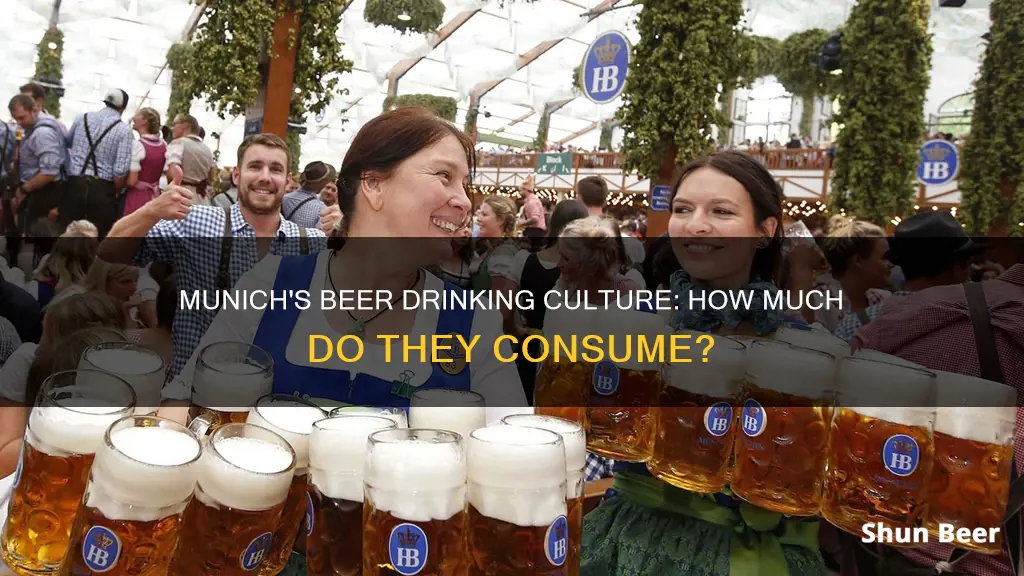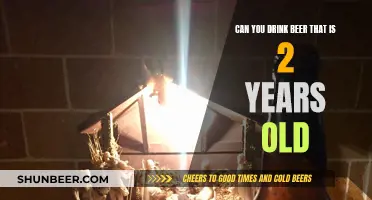
Munich is Germany's most livable city, renowned for its historic centre, pleasant restaurant scene, and surprisingly good weather. The capital of the Bavarian state is also an important place in European history, so there is much to see between visits to its famous beer halls. Beer is a way of life in Munich, deeply embedded in the city's culture. Munich's beer gardens and cosy taverns serve up a variety of beers, from classic Munich lager to exotic wheat beers and hipster ales. The city's annual Oktoberfest is the biggest and best beer festival in the world, with 14 giant beer tents, 20+ smaller ones, and over seven million litres of beer consumed. Beers at Oktoberfest are not cheap, ranging from €12.60 to €15.30 per litre in 2024.
What You'll Learn

Beer prices at Oktoberfest
The official beer price at Oktoberfest in Munich for 2024 is between €13.50 and €15.30 for a litre, an average of 3.87% more than in 2023. Last year, the price range was between €12.60 and €14.90. Beer prices vary depending on which beer tent you visit, with the Augustiner-Festhalle being the cheapest of the main Oktoberfest beer halls in 2023. Beer prices at Oktoberfest do vary, but with a price difference of around €1 per beer, it's recommended that you don't let beer prices sway where you go to get your litres of beer.
The official Oktoberfest beer is brewed exclusively in Munich and has been for centuries. Only beer from Munich breweries may be served on Oktoberfest, as dictated by custom. The six breweries from the state capital that are allowed to fill the beer mugs of Oktoberfest are Augustiner, Hacker-Pschorr, Hofbräu, Löwenbräu, Paulaner, and Spaten.
Each year, beer prices for each tent at Oktoberfest are released around June. Beer prices at Oktoberfest are not determined by the Munich city authorities but by the proprietors. The city of Munich checks the prices charged by the restaurateurs to ensure they are reasonable by comparing the prices with those of the large gastronomic establishments in the Munich city area.
Beer and Teenagers: What's the Deal?
You may want to see also

The six Munich breweries at Oktoberfest
Custom dictates that only beer from Munich breweries may be served at Oktoberfest. Weeks before the festival, the six breweries introduce their newly brewed Oktoberfest beers, building anticipation for the annual event.
The six breweries are:
- Augustiner
- Hacker-Pschorr
- Hofbräu
- Löwenbräu
- Paulaner
- Spaten
Augustiner
Munich's oldest brewery, Augustiner was founded by monks of the Augustinian Order in 1328. It was privatised in 1817 and moved to its current headquarters on Landsberger Straße in the 19th century. Augustiner Hell is considered a cult classic, served in a bulbous half-liter bottle with a monk on the label. It has an ABV of 6.2%.
Hacker-Pschorr
Hacker-Pschorr was first mentioned in a document in 1417, when it was located on Sendlinger Straße. In the 18th century, it became Munich's leading brewery under Joseph Pschorr and Maria Theresia Hacker. In 1972, the Hacker and Pschorr breweries reunited under a single brand. Hacker-Pschorr beer is served in the traditional bottles with swing stoppers, and has an ABV of 6.0%.
Hofbräu
Hofbräu was founded in 1589 as a ducal brewery under Wilhelm V, and has been run as a state-owned enterprise since 1939. It is now located in Munich-Riem, and its beer has an ABV of 6.2%.
Löwenbräu
Löwenbräu probably began in the late 14th century, but was first listed in the Munich beer brewing index in 1746. In the 19th century, it became the city's largest brewery under the Brey family. The brand logo is a lion, similar to the Bavarian heraldic animal. The Löwenbräu-Wiesntrunk has an ABV of 6.1%.
Paulaner
The Paulaner Order of monks served their first beer in 1634, making Paulaner the youngest of the Munich breweries. Paulaner beer was initially reserved for monks, but soon became popular with all Munich drinkers. Paulaner is now the largest brewery in Bavaria, and its Oktoberfest beer has an ABV of 6.0%.
Spaten
Spaten is one of the oldest breweries in Germany, founded in 1397. It was originally run by monks, but for the past two centuries has been managed by the Sedlmyer family. Spaten was the first brewery to bring the "Münchner Hell" (Munich Pale) to market in 1894, and it remains a bestseller. Spaten beer has an ABV of 5.9%.
Latuda and Alcohol: What You Need to Know
You may want to see also

Beer gardens and casual places are cheapest
Beer gardens and casual drinking spots are the cheapest places to drink in Munich. Here are some of the best:
Hirschgarten
Located near the Nymphenburg Palace, Hirschgarten is Munich's largest beer garden, with 8,000 seats. It offers international and Bavarian food, huge, cold beers, and a lively atmosphere. Beers on tap include Augustiner, Schloßbrauerei Kaltenberg, and Hofbräu Tegernsee.
Augustiner-Keller Biergarten
Dating back to 1812, Augustiner-Keller is Munich's oldest beer garden, with a capacity of 7,000 visitors. It's a little off the beaten track, but it's well worth a visit for its authentic atmosphere. Fresh Augustiner beer is served straight from the wooden barrel, and there's a range of cheap German classics on the menu. Visitors are also welcome to bring their own food.
Chinesischer Turm
This beer garden is located in the English Garden, one of Munich's most popular parks. It can accommodate up to 7,000 people and serves Lowenbrau beer, with traditional brass bands and a breakfast buffet on Sundays.
Aumeister
Aumeister is another great spot on the edge of the English Garden. It used to be a watering hole for the duke and his royal hunting company. Enjoy a royal Hofbrau beer under the chestnut trees, with a view of a lovely pond and a Steckerlfisch (grilled fish on a stick). There's also live music on Thursdays.
Biergarten Viktualienmarkt
Viktualienmarkt is Munich's most centrally located beer garden, in the heart of the city's oldest farmers' market. It has 600 seats and a mixed crowd of tourists and locals. You can bring your own food and buy delicacies from the market stalls, while trying beers from a rotating selection of local breweries, including Augustiner, Hacker-Pschorr, Löwenbräu, Hofbräu, Paulaner, and Spaten.
Richelbräu
Richelbräu is a hobby brewery and cultural community space that puts on film screenings, brewery bicycle tours, and other entertainment. It's not officially allowed to serve beer, but it gets around this rule by offering donation-based tastings.
Beer Expiration: Is It Safe to Drink?
You may want to see also

Beer halls and taverns
Munich's beer halls and taverns are an integral part of the city's culture and history. Here are some of the most notable ones:
Hofbräuhaus
Said to be the world's most famous beer hall, Hofbräuhaus is a 16th-century tavern that has become an emblem of German tavern culture and the concept of 'Gemütlichkeit' (cosiness). With over 1000 seats on the ground floor, it is a popular hangout for both tourists and locals, who enjoy the live music, traditional dirndl-clad waitresses, and home-brewed beer served in one-litre steins. The menu features hearty Bavarian food, including veal sausage with sweet mustard and pork roast. The outdoor area features a huge, sunny beer garden, and other rooms host folk dance nights and festivals.
Weisses Bräuhaus
An institution in Munich’s culinary scene since the 19th century, Weisses Bräuhaus specialises in Weissbier (wheat beer). The menu poetically describes each beer, and the food ranges from good old-fashioned German dishes and salads to vegetarian options. For the adventurous eater, traditional Munich dishes such as sweet-sour lung of veal, pork liver with roasted onions, or pork kidneys with fried potatoes are also available. The atmosphere is down-to-earth, with no frills, just like it might have been 100 years ago.
Der Pschorr
Located in Viktualienmarkt, Der Pschorr pours its Hacker-Pschorr-Edelhell beer straight from wooden barrels. The food is fantastic, with all ingredients sourced locally, including produce from Bavarian orchards, cheeses from local dairies, and meats from Munich sausage makers. The Murnau Werdenfelser beef, a rare breed of local cattle, and the Pressack, a pork sausage studded with fat and seasoned with marjoram, are particular highlights. For those looking for something lighter, there is also a "healthy kitchen" section on the menu.
Augustinerkeller
Augustinerkeller has been serving its mild Edelstoff beer, freshly tapped from wooden barrels, since 1812. The restaurant offers several different dining experiences, including a cosy and lively Bierstuebel with old paintings and chandeliers, a beer cellar with vaulted ceilings and brick walls, a chestnut-shaded beer garden, and a bustling main beer hall. The menu features traditional Bavarian cuisine as well as some international and vegetarian dishes.
Paulaner Bräuhaus
With a beer brewing tradition dating back to 1889, Paulaner Bräuhaus serves its beer straight from traditional shiny copper tanks. The beer even flavours some of the seasonal dishes on the menu, like the goulash in beer sauce, and for the adventurous foodie, there is wheat beer sorbet. If you can’t get enough, come here on a Monday for an all-you-can-eat Bavarian buffet.
Löwenbräukeller
When the Löwenbräukeller opened in 1883, it was a sensation, as it was the first beer hall in Munich to offer tablecloths and napkins. The restaurant still features wooden floors, high vaulted ceilings, chandeliers, and oil paintings. The menu celebrates classic Bavarian dishes such as roast pork in caraway gravy with bread dumplings and cabbage salad, and roasted pork knuckle with dumplings and sauerkraut. The Löwenbräukeller also set up the first-ever beer tent at Oktoberfest in 1867, which became one of the festival's most famous attractions.
Post-Massage Beer: Is It Safe to Drink Alcohol?
You may want to see also

German Purity Laws
The German Beer Purity Law, or the Reinheitsgebot, is a series of regulations that limit the ingredients used in beer production in Germany and the states of the former Holy Roman Empire. The law was first adopted in the Duchy of Bavaria-Munich in 1487 and then across all of Bavaria on 23 April 1516. It is the oldest food safety law still in existence and the oldest regulation related to food and drink in the world.
The law was enacted to prevent unscrupulous brewers from using unsavoury and dangerous ingredients to stretch what was then considered a basic foodstuff. It also prevented price competition with bakers for wheat and rye by restricting the grains used in beer production to barley, thus ensuring the availability of affordable bread. The rule may have also had a protectionist role, as beers from Northern Germany often contained additives that could not be grown in Bavaria.
The 1516 Bavarian law, issued by Duke Wilhelm IV, stated that only water, barley, and hops could be used as key ingredients in beer production. The law also set the price of beer, limited the profits of innkeepers, and made the confiscation of impure beer a penalty. While the properties of yeast were unknown at the time, it was later added to the list of permitted ingredients after its role in fermentation was discovered in the 19th century.
Modern versions of the law have included significant exceptions for different types of beer, such as top-fermented beers, export beers, and different regions. The basic law now declares that only malted barley, wheat, rye, hops, water, and yeast are permitted. The Reinheitsgebot strictly forbids the use of extenders such as rice, corn, sorghum, and other grains.
While some critics argue that the law is antiquated and restricts creativity, it is still considered a part of Germany's national identity, with many brewers continuing to follow the original 1516 purity law. The law has also influenced brewing practices around the world and is seen as a valuable marketing tool, with some breweries outside of Germany also claiming compliance with the Reinheitsgebot.
Wade Boggs' 107 Beer Challenge: Fact or Fiction?
You may want to see also







